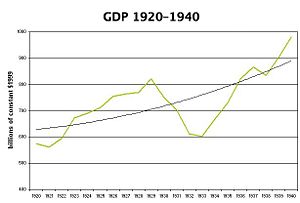What is an economic recession?
In a perspective as broad as nation wide, or macroeconomically, a recession is a slightly obvious decline in Gross Domestic Product (GDP, just think of it as the total wealth or wellness all people within a nation produce within a given year) compared to previous quaters, or in a business cycle. A decline is only regarded as a recession if it has lasted more than 2 quarters. Also, the decline should not be too apparent as to be an economic depression (approx. 10% drop of GDP) or even more devastating as to be a economic collapse.
 In a recession, all economic activities such as production, exchange, allocation and consumption are reduced significantly thus effectively bringing down productivity and GDP relative to potential total output. However it’s less agonizing than a depression such as that in the 1930s.
In a recession, all economic activities such as production, exchange, allocation and consumption are reduced significantly thus effectively bringing down productivity and GDP relative to potential total output. However it’s less agonizing than a depression such as that in the 1930s.
What causes economic recessions then?
Theoretically, economic recessions are unavoidable as in a perpetual fluctuation of economic boom and decline. Not a single nation is doomed with forever recession nor are they blessed with forever booming.
It can be really tricky and confusing to reason in economics because sometimes it’s hard to grasp what is the cause and what is the result anyway. Generally accepted causes for a recessions include:
- Over spending of government overseas or in non-productive ways
- Speculation for a upcoming recession or just the fear that they might not get enough income to cover all that they want in usual, thus forming a chain to slow down the economic growth
- Inflation or devalued domestic currency
Effects of economic recessions
The most apparent and straightforward result of an economic recession is the reduction in overall national output wherein all people suffer from a declined standard of living compared with normal output or full potential output. The overall effects of economic recessions include:
- Reduced average wage because of the significant drop in overall demand because in turn the purchasing power shrinks due to reduction in averaged wage
- Unemployment rate climbs because considerable portions of national production cannot find its way into households
- Bankruptcies happen more often than usual
- Inflation that devalues domestic currency
- Stock market suffer from a bleak season
Measures to rescue it from an economic recession
- Increase in public domestic spending to ignite production
- Increase in money supply to encourage consumption
- Decrease in interest rate to encourage investment
- Decrease in taxation to stimulate market activities






Comments 2